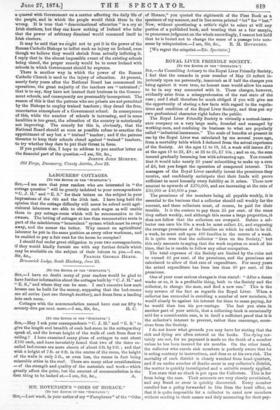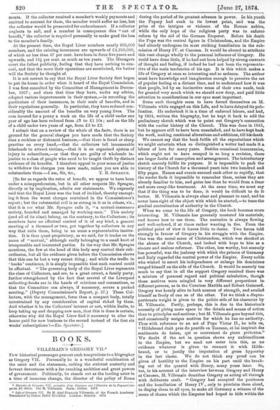ROYAL LIVER FRIENDLY SOCIETY.
[TO THE EDITOR OF THE " SPECTATOR.")
Strt,—As Consulting Actuary to the Royal Liver Friendly Society, I feel that the remarks in your number of May 23 reflect in- juriously upon me personally, inasmuch as if half the charges you bring against it were true, no honest man would allow his name to be in any way connected with it. These charges, however, evidently arise from a misapprehension of the real state of the case ; and I shall therefore be much obliged if you will give me the opportunity of stating a few facts with regard to the regula- tions and condition of the Royal Liver Society, and thus put my own professional character right before the public.
The Royal Liver Friendly Society is virtually a mutual-insur- ance company on a very large scale, founded and managed by working-men, and confining its business to what are popularly called " industrial insurances." The scale of benefits at present in use by the Royal Liver was calculated by me several years ago, from a mortality table which I deduced from the actual experience of the Society. At the ages 11 to 18, ld. a week will insure £9 ; at the ages 19 to 22, £8 ; at 23 to 25, £7 108. ; and so on, the sum insured gradually becoming less with advancing age. You remark that it would take nearly 30 years' subscribing to make up a sum of £6, but you forget the operation of compound interest. The managers of the Royal Liver carefully invent the premiums they receive, and confidently anticipate that their funds will prove sufficient to meet honestly every liability as it arises. These now amount to upwards of £370,000, and are increasing at the rate of £30,000 or £40,000 a year.
The premiums of the members being all payable weekly, it is essential to the business that a collector should call weekly for the amount, and these collectors must, of course, be paid for their trouble. It is the custom to pay them 25 per cent. of the sums they collect weekly, and although this seems a large proportion, it does not follow that the collectors aro overpaid. Before a col- lector can earn his 30s. a week he must collect £6, and supposing the average premiums of the families on which he calls to be 3d. a week, he must call upon 480 families iu the course of a week. It is quite true that the collector " lives on the Society," but this only amounts to saying that the work requires so much of his time, that he is unable to follow any other occupation.
The total expenses of the Society are limited by the rules not to exceed •10 per cent. of the premiums, and the premiums are calculated to allow of that rate of expenditure. For many years the actual expenditure has been less than 40 per cent. of the premiums.
One of your most serious charges is thus stated: " After a dozen weeks or so, it is a profitable thing, both to the Society and the collector, to change the man, and find a new one." This is the very reverse of the fact as regards the Royal Liver. When a collector has succeeded in enrolling a number of new members, it would clearly be against his interest for them to cease paying, for he would then lose his per-tentage. The fact you state in another part of your article, that a collecting-book is occasionally sold for a considerable sum, is in itself a sufficient proof that it is the collector's interest to prevent, rather than encourage, seces- sions from the Society.
I do not know what grounds you may have for stating that the sick and dying are often entered on the books. The dying cer- tainly are not, for no payment is made on the death of a member unless he has been insured for six months. On the other hand, the collector who enrols sick members is perfectly aware that he is acting contrary to instructions, and does so at his own risk. The mortality of each district is closely watched from head-quarters, and if an undue number of deaths occur in any collector's district, the matter is quickly investigated and a suitable remedy applied.
You state that no check is put upon the Collectors. This is far from being the case. Their accounts are very closely scrutinised, and any fraud or error is quickly discovered. Every member enrolled has a policy forwarded to him from the head office, so that it is quite impossible for a collector to enrol new members without sending in their names and duly accounting for their pay- ments. If the collector received a member's weekly payments and omitted to account for them, the member would suffer no loss, but the collector would be prosecuted for embezzlement. If a collector neglects to call, and a member in consequence dies " out of benefit," the collector is required personally to make good the loss to the member's family.
At the present time, the Royal Liver numbers nearly 600,000 members, and the existing insurances are upwards of £4,250,000, of which no less than 47 per cent. have been iu force five years and upwards, and 14i per cent. as much as ten years. The Managers court the fullest publicity, feeling that they have nothing to con- ceal, and that the more their operations are scrutinised, the better will the Society be thought of.
It is not correct to say that the Royal Liver Society first began to put its house in order when it heard of the Royal Commission. I was first consulted by the Committee of Management in Decem- ber, 1867 ; and since that time they have, under my advice, adopted various improvements in their system,—in recording the particulars of their insurances, in their scale of benefits, and in their regulations generally. In particular, they have reduced con- siderably the amount of the benefits on very young lives. The sum insured for a penny a week on the life of a child under one year of age has been reduced from to £1 10s ; and on the life of a child under two years of age, from £3 to £2.
I submit that on a review of the whole of the facts, there is no ground for the general charges you have made that the Society does a reckless or dishonest business,—that there is fraud or sharp practice on every hand,—that the collectors tell innumerable falsehoods to attract victims,—that it is an organised system of injury to subscribers,—or that they are guilty of wholesale in- justice to a class of people who need to be taught thrift by distinct evidence of its benefits. I therefore appeal to your sense of justice to withdraw the charges you have made, unless you are able to substantiate them.—I am, Sir, •&c., T. B. SPRAGUE.
[So far as regards the rates of benefit, we appear to have been under a misapprehension, but in all other respects Mr. Sprague, directly or by implication, admits our statements. We expressly said that the Royal Liver was the best of its kind, thereby exempt- ing it from the worst charges contained in the Commissioner's report ; but the substantial evil is as strong in it as in others, viz., that it is not what Mr. Sprague calls it, "a mutual-insurance society, founded and managed by working-men." This society (and all of its class) belong, on the contrary, to the Collectors ; its members have no effectual control of it of any kind, a general meeting of a thousand or two, got together by collectors in any way that suits them, being in no sense a representative institu- tion. It is thus quasi-proprietary, as we said, for it trades on the name of "mutual," although really belonging to a small knot of irresponsible and interested parties. In the way that Mr. Sprague mentions, the few at the head of this body may control their sub- ordinates, but all the evidence given before the Commission shows that this can be but a very recent thing ; and while the traffic in ' books' continues, it is simply impossible that such control could be effectual. "The governing body of the Royal Liver represents the class of Collectors, and are, to a great extent, a family party, further strengthened by the fact that several of the Liverpool collecting-books are in the hands of relations and connections, so that the Committee can always, if necessary, secure a packed meeting." (Deputy Commissioner's Report, p. 27.) These Col- lectors, with the management, form thus a compact body, totally unrestrained by any consideration of capital risked by them. And whether it be the Collectors' interest or not, within limits, to keep taking up and dropping new men, that this is done is certain, otherwise why did the Royal Liver find it necessary to alter the bonus paid for new business to the second instead of the first six weeks' subscriptions?—ED. Spectator.]



































 Previous page
Previous page